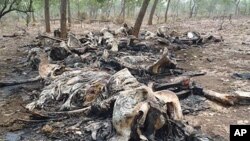Environmental activists in Cameroon say the military is mounting an offensive against poachers in the north, who are believed to have killed half of the country's remaining elephants.
Cameroon's Defense Ministry has declined to discuss ongoing military operations with journalists. But environmental activists say the government has sent more than 100 soldiers to the remote northern reaches of the country to hunt down armed poachers who are believed to have killed as many as 300 elephants since January.
Cameroonian environmental journalist, Jean Vincent Tchienehom, spoke to VOA from Bouba N’Djida National Park in the north.
He said poachers have been able to hunt there with impunity throughout the dry season for years. He said they enlist the help of local villagers, who are happy to take the elephant meat and be rid of the large beasts who trample their crops. He said the poachers are only after the ivory, which they sell at high profit margins to Asian markets, primarily the Chinese. The poachers then use this money, he said, to buy arms for conflicts in the region, particularly in Sudan.
The World Wildlife Fund said the Arabic-speaking poachers are believed to be from Sudan and to have entered the country illegally on horseback via Cameroon's border with Chad.
Conservationists say the lack of enforcement on the border and in the park have left elephants vulnerable to repeated annual attacks.
World Wildlife Fund regional communications manager, Florence Anouboudem, said Cameroon's elephants account for 80 percent of the population that remains in all of Central Africa.
"The future of conservation is in the north of Cameroon because there you have the highest population of elephants and also the population of the North don't eat bushmeat, so they will never go killing species, killing herds, to eat or to sell."
Elephants are what conservationists call a "keystone" species, as they play a pivotal role in the survival of the ecosystem.
The massive animals, weighing as much as seven tons, clear paths, fell trees and dig water holes that are then used by humans and other animals. Elephant dung is a valuable, nutrient-rich fertilizer and a highly effective means of dispersing seeds.
Still, WWF's Anouboudem said conservation remains low priority for African governments and residents.
"People will not understand why an elephant is so important when we ourselves don't have enough food, don't have enough drugs for our children, don't have all the basic resources," said Anouboudem.
The World Wildlife Fund, as well as other environmental groups and the European Union, have sounded the alarm in recent years over increased poaching in Cameroon's national parks.
Conservationists say Cameroon's government must stop this year's slaughter, secure the border area and bring poachers to justice.
News
Cameroon Military to Hunt Down Elephant Poachers
- By Anne Look
